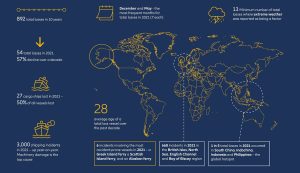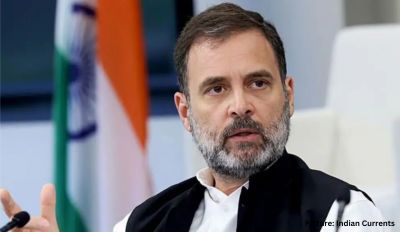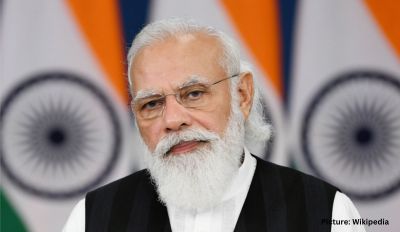(IPS) – As 2022 draws to a close, we are confronted with an unprecedented collision of global risks, interacting and reinforcing each other in dangerous new ways. The impacts of Russia’s invasion of Ukraine are still rippling outwards, colliding and combining like waves on a sea. The heightened threat of nuclear conflict, the global energy crisis, the rising cost of food, deepening poverty and inequality: these consequences are interacting with the ongoing impacts of the COVID-19 pandemic and the effects of climate change.
This confluence of global risks has led to unwelcome new terms entering the dictionary, such as ‘polycrisis’ and ‘multicrisis.’
In the face of such complex challenges, it’s easy to feel helpless and paralyzed. And yet, if this year has shown us anything, it’s that we need an urgent upgrade of our systems of cooperation to tackle them.

It starts with making sure we have the right knowledge. Climate scientist Johan Rockström, a board member of our foundation, has written powerfully on the need for an international consortium of scientists to provide shared insights on the emerging interactions between risks.
At the Global Challenges Foundation, we’ve just released our annual review of global catastrophic risks, risks that threaten the survival of more than ten per cent of humanity. This year’s report shows how, more than ever, our systems and structures for preventing and managing these risks are both outdated and inadequate.
Whether it’s climate change, environmental breakdown, nuclear conflict, pandemics or artificial intelligence, we have a systemic problem with processing and acting on the complex challenges that lie in the intersections.
Of course, there is no one magic solution, given the multilateral system that we inhabit. However, there are many existing proposals to improve the mechanics of global governance that could be immediately fast tracked.
For example, there are several important proposals in the United Nations Secretary-General’s 2021 report, Our Common Agenda. These include the idea for an Emergency Platform that would be triggered by a major crisis such as the use of a nuclear weapon and coordinate the global response.
The report also proposes reviving the UN’s Trusteeship Council, inactive for many years, as a multi-stakeholder body to tackle emerging challenges and to act to preserve the global commons on behalf of future generations.
The failure of the COP27 climate talks in Egypt to agree strong measures to curb fossil fuel production has demonstrated how intergovernmental negotiations are not producing rapid enough action on climate change.
On top of this, the global energy crisis has led to some countries slowing or shelving their green agendas, in a year of extreme temperatures and climate-related crises.
We urgently need to find alternative ways of collaborating to prevent catastrophic climate change. One key proposal is a carbon tax – administered at both global and national levels – with the proceeds going to the communities who are most affected.
The International Monetary Fund concluded that, of all the various recognised strategies to reduce fossil fuel emissions, implementing a carbon tax would be the most powerful and efficient.
Of course, this may not be the easiest ‘sell’ politically during a cost-of-living crisis but evidence from countries like Canada shows that it can be done gradually and sensitively.
The spread of COVID-19 around the world since 2020 has highlighted the linkages between environmental destruction and pandemics. COVID-19 is unlikely to be the last pandemic that humanity faces.
As renowned epidemiologist and public health expert Professor David Heymann writes in his pandemics chapter in our report, as well as tackling the root causes of new pathogens coming into contact with humans, we need to upgrade the international frameworks that govern how countries report on new disease outbreaks.
This means enacting a stronger enforcement mechanism to the World Health Organization’s International Health Regulations, and a Pandemic Treaty.
When it comes to nuclear risk, looming ever larger over Ukraine, it’s now more likely than ever that nuclear weapons will be used in either military actions, miscalculation or by accident than at any time since the beginning of the nuclear age.
The international community must treat all threats to use nuclear weapons very seriously. Even ‘small’ or ‘tactical’ weapons can cause terrible damage and their use would undermine the nuclear taboo in place since their use at the end of the Second World War.
Nuclear expert, and contributor to our report, Kennette Benedict says there is still much more we can do to prevent a nuclear disaster. IAEA Director General Raffael Grossi and his colleagues are doing heroic work to prevent nuclear plant disasters in Ukraine.
The international community must continue to support the agency and provide more funding for IAEA’s work. Explicit protection of nuclear plants in violent conflicts and war should be codified in international law.
Only with a clear understanding of each of the greatest risks facing humanity can we move forward to rethink how we could better manage them. And only with new kinds of global cooperation can we deal with today’s complex web of interlocking and reinforcing global risks to ensure a habitable, safe and peaceful future. As we say goodbye to this year of global risks, this should be top of our ‘to do’ list for 2023.
(Jens Orback is Executive Director of The Global Challenges Foundation: IPS UN Bureau)











